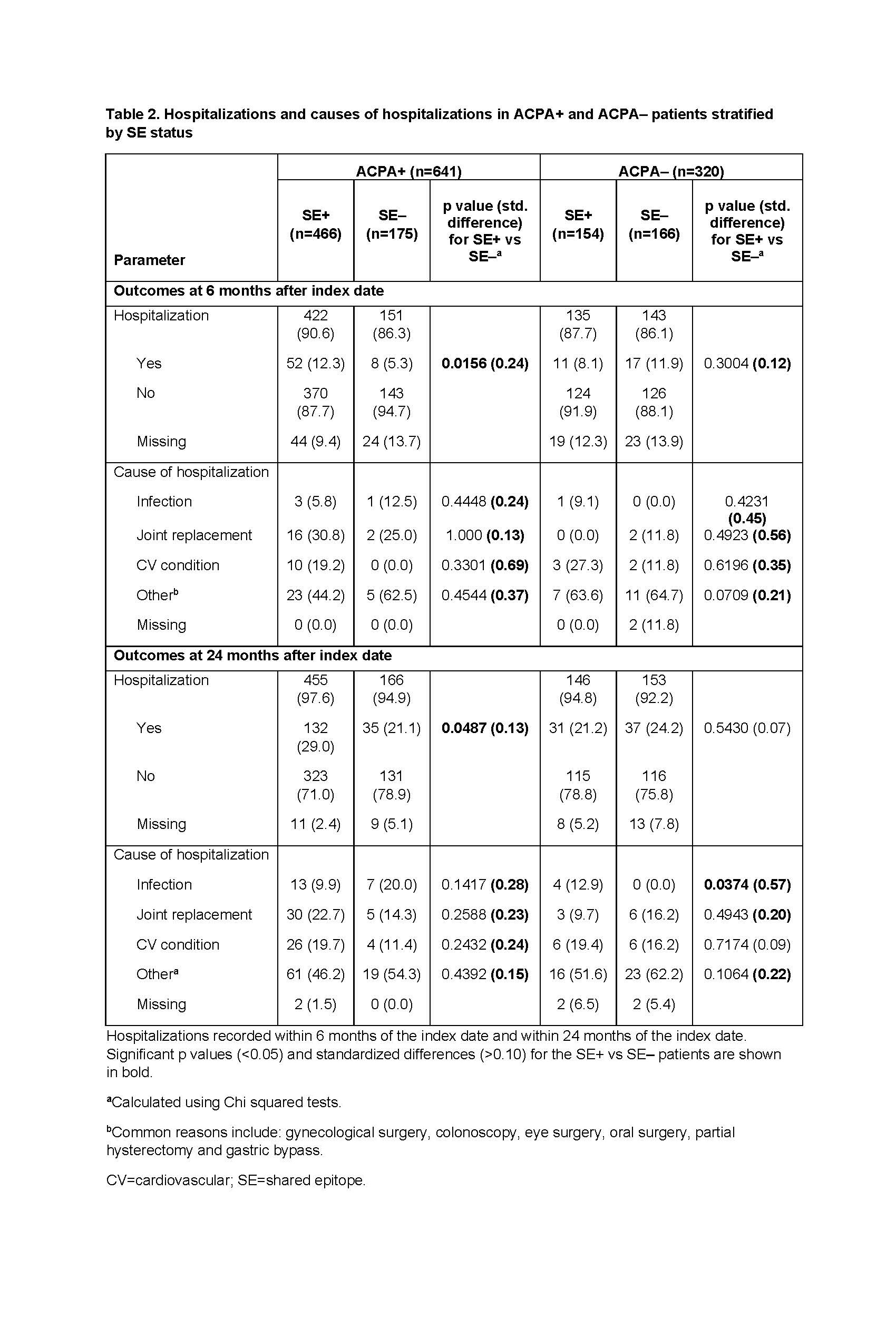Session Information
Date: Saturday, November 7, 2020
Title: RA – Diagnosis, Manifestations, & Outcomes Poster II: Biomarkers
Session Type: Poster Session B
Session Time: 9:00AM-11:00AM
Background/Purpose: A strong genetic association between HLA-DRB1 alleles containing the shared epitope (SE) and RA has been described.1 The SE has been associated with ACPA positivity,2 earlier onset of RA,3 harder-to-treat disease2 and poor prognosis.4 The purpose of this analysis was to assess whether ACPA and SE status are associated with risk of hospitalization in RA.
Methods: This was a retrospective analysis of patients (pts) enrolled in the Brigham and Women’s Rheumatoid Arthritis Sequential Study (NCT01793103; BRASS) registry between March 2003 and June 2019. Pts with known ACPA and SE status were included. HLA-DRB1 SE status (1 or 2 alleles [+], 0 alleles [–]) was determined by allele-specific polymerase chain reaction and DNA sequencing for most pts and by genome-wide association study-based imputation for the others. Pts were stratified by ACPA and SE status. Index date was the date of the baseline visit. Baseline demographics and disease characteristics, hospitalization rates (yes/no) and causes of hospitalization over 6 and 24 months were reported descriptively. Associations between SE status and hospitalization were examined using multivariable adjusted logistic regression models.
Results: Of 961 pts with known ACPA and SE status included in the analysis, 641 were ACPA+ and 620 were SE+ (466 [48%] were both ACPA+ and SE+). In ACPA+ pts, most baseline characteristics were similar between those who were SE+ and SE– (Table 1); SE+ vs SE– pts were more likely to receive conventional synthetic or biologic DMARDs. Among ACPA– pts, SE+ vs SE– pts had longer RA duration and were more likely to be RF+. Among ACPA+ pts 6 months after index date, the rate of hospitalization in SE+ pts was twice that for SE– pts (12.3% vs 5.3%; p=0.0156); joint replacement and cardiovascular (CV) conditions combined were more common causes of hospitalization in SE+ pts (50%) than SE– pts (25%; Table 2). Similarly, among ACPA+ pts 24 months after index date, the rate of hospitalization remained significantly higher for SE+ vs SE– pts (29% vs 21%; p=0.0487), with joint replacement and CV conditions combined being more common causes of hospitalization (SE+, 42% vs SE–, 26%; Table 2). No notable differences were seen in ACPA– pts. Among ACPA+ pts, the adjusted risk of hospitalization was 4.84-fold higher in SE+ vs SE– pts at 6 months (p=0.0036) and 1.56-fold higher at 24 months (p=0.0793; Figure 1). Overall, joint replacement and CV conditions combined accounted for 46.0% and 24.0% of hospitalizations at 6 months in SE+ vs SE– pts and 39.9% and 29.2% of hospitalizations at 24 months, respectively.
Conclusion: In ACPA+ pts with established RA, being SE+ increased the risk of hospitalization over 6 months approximately 5-fold. The majority of the increased risk in hospitalization was accounted for by joint replacement and CV conditions, indicating the more rapidly progressive disease and greater co-morbidity burden associated with SE+ in this pt population.
References
- Gregersen PK, et al. Arthritis Rheum 1987;30:1205–1213.
- Zhuo J, et al. Presented at the EULAR 2020. Poster SAT0061.
- Wu H, et al. Arthritis Rheum 2004;50:3093–3103.
- Alemao E, et al. Arthritis Rheumatol 2018;70(suppl 10):abstract 71.
Medical writing: Andrea Plant (Caudex).
To cite this abstract in AMA style:
Zhuo J, Suryavanshi M, Priya L, Khaychuk V, Vaile J, Cui J, Shadick N, Weinblatt M. Increased Risk of Hospitalization in Patients with RA Who Are ACPA Positive and Shared Epitope Positive [abstract]. Arthritis Rheumatol. 2020; 72 (suppl 10). https://acrabstracts.org/abstract/increased-risk-of-hospitalization-in-patients-with-ra-who-are-acpa-positive-and-shared-epitope-positive/. Accessed .« Back to ACR Convergence 2020
ACR Meeting Abstracts - https://acrabstracts.org/abstract/increased-risk-of-hospitalization-in-patients-with-ra-who-are-acpa-positive-and-shared-epitope-positive/



